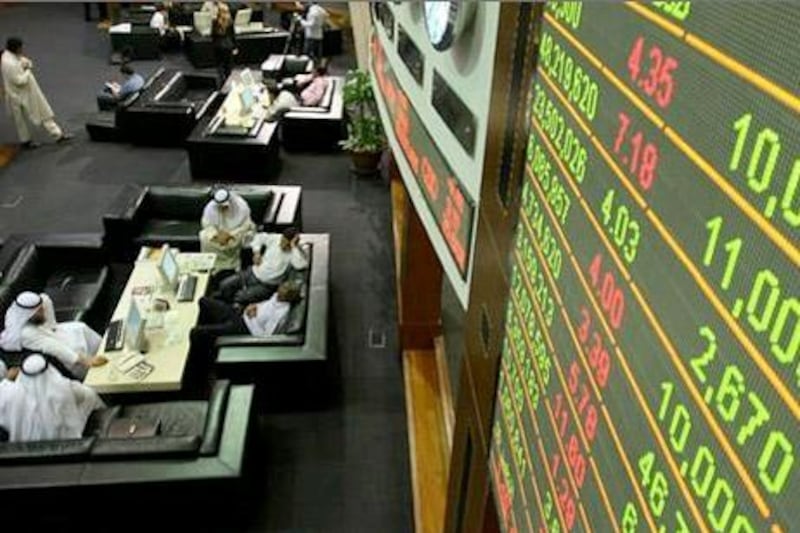Shares on Dubai's benchmark index shed Dh2 billion (US$544.4 million) yesterday as traders took profits from a bull market that has run since the start of the year.
"People took their profit and got out," said Fathi ben Grira, the chief executive at the financial services firm MenaCorp in Abu Dhabi.
The Dubai Financial Market General Index fell 4.8 per cent, the biggest one-day drop since January 2010, to close at 1,607.77. For every stock that rose, 13 fell, with most stocks hitting the 10 per cent decline limit at which trading is stopped. Dubai's stock market capitalisation fell to Dh50.3 billion (US$13.69bn), from Dh52.3bn on Tuesday.
Lingering concerns from Europe about the fallout from the Greek bailout deal also rattled markets.
The Stoxx Europe 600 Index was down 2.7 per cent, and the Standard & Poor's 500 Index was down 1.5 per cent ahead of today's deadline for creditors to accept a debt-swap deal to pave the way for a bailout of Greece by the euro zone and IMF.
"It was always going to be a struggle for the UAE market to overcome the negative feeling externally from the day before," said Julian Bruce, the head of institutional equity sales at EFG-Hermes in Dubai.
"Some of the gains have been quite extreme and it was too tempting for sellers to sit back. I don't expect that we will go back and test the lows of early January."
Retail investors, who account for about 80 per cent of trading on the country's bourses, rushed into the Dubai markets in January amid speculation that a strategic investor was accumulating shares in Arabtec Holding.
Shares in the Dubai contracting company slumped by 9.8 per cent yesterday, after market data on Monday showed Aabar Investments emerged as the latest prominent investor in the company, with a 5.28 per cent stake. Arabtec has risen 84.2 per cent since January.
Much of the excitement on Dubai's main market had been led by enthusiasm over Saudi Arabia possibly opening up its exchange to international investors, said Mark Mobius, the executive chairman of Templeton Asset Management.
"The key factor now in the UAE is the opening up of the Saudi market. If the Saudi market opens, that's very positive for the whole region," he said.
He said he expected Saudi Arabia would be cautious about allowing international investment in its banks, but that the overall gains would provide a big boost to regional and Saudi stocks.
"There's a lot of money that would be attracted to the region," Mr Mobius added. "If [Saudi Arabia] really opens, we'll be able to put a lot more money in."
The anticipated easing of the Saudi market for international investors has reached a feverish level of excitement in Dubai's financial heartland.
Companies including VTB Capital and Nomura Securities have laid the groundwork for increased participation in the kingdom's capital markets.
Daily traded values of stocks on its Tadawul All-Share Index hit highs of $4.29bn last month - the highest level since before the collapse of Lehman Brothers in September 2008.
ghunter@thenational.ae






